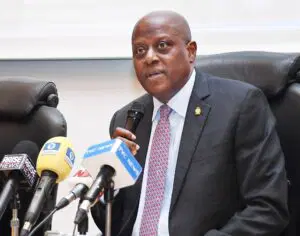Business
Naira shed 2.6% in March despite $668m CBN intervention

The naira depreciated further in March 2025, dropping by 2.4% and 2.6% at the Nigerian Autonomous Foreign Exchange Market (NAFEM) and the parallel market, respectively, amid persistent demand pressure.
According to Afrinvest’s latest Monthly Market Report, the naira closed the month at ₦1,536.82/$ at NAFEM and ₦1,530/$ at the parallel market, a clear indication of ongoing volatility in Nigeria’s foreign exchange market.
AIICO Capital, in its own March macroeconomic update, confirmed the currency’s significant loss in value despite the Central Bank of Nigeria (CBN) injecting $668.8 million to stabilise the market. “Despite interventions, the naira weakened by 2.97% month-on-month, down from ₦1,492.49/$ to ₦1,536.82/$,” AIICO reported.
The report highlighted robust demand from foreign portfolio investors and local corporates, which outstripped available supply. The parallel market mirrored this trend, losing ₦43.50/$ to close at ₦1,536/$.
Although liquidity briefly improved mid-month with CBN support, the naira remained under pressure through the end of March. On a quarterly basis, the naira declined by 7 basis points at NAFEM, while external reserves dropped by $110 million to $38.31 billion.
Looking ahead, AIICO projected continued liquidity injections by the CBN, though global economic risks—including fresh U.S. tariffs under President Donald Trump—could increase capital flight and market volatility.
Backing this, the CBN’s Financial Markets Department Director, Omolara Duke, confirmed that the apex bank intervened again between April 3 and 4 with a $197.71 million injection into the FX market to ensure stability. The dollars were sold at rates between ₦1,519 and ₦1,595.20/$.
Despite this, market pressure intensified by midweek as rising offshore demand and weaker oil prices—following an OPEC+ output hike—drove the naira to ₦1,570/$ before closing the week at ₦1,567.02/$. Foreign reserves declined further by $149 million to $38.15 billion.
Analysts at Afrinvest warned that the end of the naira-for-crude swap initiative could further worsen the FX crisis, as refineries and PMS importers rejoin the dollar-seeking queue. “We expect the naira to remain pressured near-term,” the report stated.
CardinalStone also noted that the FX market has been negatively impacted by capital flight and higher local dollar demand, recording a 1-month return of -8.6% and a year-to-date return of -5.8%.
Former Zenith Bank chief economist, Marcel Okeke, cautioned that the Trump-led global tariff war could spark a wave of imported inflation in Nigeria. “We’re likely to see an uptick in imported inflation, especially given our high import dependence,” Okeke said.
Business
NASC Backs Digital Push to Revolutionize Seed Sector

- Says Seed Tracker boosts traceability, adopted in three African countries
- Bt cowpea, global alliances key to Nigeria’s seed market expansion- DG
The National Agricultural Seed Council (NASC) has reaffirmed its commitment to driving innovation in Nigeria’s seed industry through the use of digital technology.
Speaking during a refresher training session for seed companies, licensed seed inspectors, and lead outgrowers, Director General of NASC, Fatuhu Muhammad, highlighted the strategic role of the Seed Tracker platform in strengthening the inspection and certification of crop seeds nationwide.
According to Muhammad, the platform has already gained regional traction, having been exported to Tanzania, Uganda, and Sierra Leone. He revealed that many more countries have expressed interest in adopting the technology, which has become a benchmark for seed system transparency in Africa.
“Over 52 seed companies have input data on the Seed Tracker on crops such as cassava, cowpea, yam, potato, rice, and maize,” he noted. “The platform, developed to enhance transparency and traceability in seed certification, is modernising Nigeria’s agriculture.”
As part of its strategy to improve efficiency and reduce operational bottlenecks, NASC plans to expand the use of private inspectors, reducing the workload on its officers while ensuring wider coverage and quality assurance.
Muhammad also announced ongoing strategic partnerships with international bodies, including the International Seed Testing Association (ISTA), the International Union for the Protection of New Varieties of Plants (UPOV), the OECD Seed Schemes, and others. These collaborations, he said, are aimed at unlocking access to global seed markets.
He emphasized Nigeria’s potential to dominate Africa’s seed market, citing the case of cowpea, a major dietary protein source. Despite its importance, the cowpea seed system has been hindered by poor storability and pest infestation. However, recent adoption of Bt cowpea, a genetically modified variety with pest resistance, is already yielding positive results.
Muhammad commended the Donald Danforth Plant Science Center in the United States for supporting Nigeria’s biotechnology ecosystem through the ENCIBBS project, which has bolstered the country’s capacity in biotech research and development.
Participants at the training expressed satisfaction with the knowledge gained. Hassan Yohanna Lassa, Managing Director of Boom Seeds Nigeria Ltd, praised the Seed Tracker as a transformative tool in combating seed adulteration and improving production quality across Nigeria.
“It helps track the source and purity of seeds, promoting transparency throughout the seed value chain. We are now committed to ensuring our farmers and products are fully integrated into the platform,” he stated.
Another participant, Chukwuemeka Umeh, described the training as a major step toward modernising Nigeria’s agricultural system. “We now have the skills to detect early symptoms of seed-borne diseases and implement control measures, thanks to the digital tools and capacity-building provided,” he said.
With such initiatives, NASC is positioning Nigeria to not only achieve food security but also to become a leading hub in Africa’s evolving seed industry.
Banking
Chiderije Mbah Wins One Day MD/CEO Of Wema Bank PLC

- … Set To Run The Bank’s Affairs For 24 Hours In An Unforgettable Children’s Day Experience
In a heartfelt celebration of 2025 Children’s Day, Wema Bank, Nigeria’s most innovative bank and pioneer of Africa’s first fully digital bank, ALAT, has unveiled 12-year-old Chiderije Mbah as its One-Day Managing Director/CEO for May 27, 2025, as part of a special initiative aimed at nurturing the next generation of Nigerian leaders. The memorable experience, which took place today, at the bank’s headquarters in Lagos, Marina, spotlighted Wema Bank’s ongoing commitment to investing in the future even as it marks 80 remarkable years of legacy and impact.
Chiderije Mbah became the winner of the One-Day Wema Bank MD/CEO initiative launched in May 2025, to mark this year’s Children’s Day celebration. He was chosen after sharing a spirited video explaining his dream of leading a bank and his vision for making finance more fun and accessible for children. His entry, submitted through a social media challenge, stood out among dozens who applied to be in the position.
The One-Day Wema Bank MD/CEO was the high point of a broader Children’s Day initiative by Wema Bank, which invited children across the country to participate in an online challenge. To qualify, children were asked to post a short video dressed in Wema colours and share the banking role they aspired to, while either holding or opening a Royal Kiddies Account (for ages 0–12) or an ALAT Xplore Wallet (for teenagers 13–17). The campaign blended fun with purpose, introducing thousands of young Nigerians to early financial education and the power of dreaming big.
On Tuesday, May 27, 2025, Chiderije stepped into the spotlight at Wema Bank’s Lagos Headquarters, receiving a purple-carpet welcome and taking his seat at the helm of the bank for a day packed with leadership, learning, and excitement. Enjoying a full day of activities; from a guided tour of the head office to holding his own executive briefing session in the boardroom, he will also be addressing senior executives of the bank.
“This is the best day of my life,” said Chiderije Mbah. “Wema Bank made me feel important. I am learning so much about being a leader and how banking works. I’ll tell all my friends to open a Wema Bank Royal Kiddies Account so they can also start learning how to save and maybe one day, they can be MD too!”
Speaking on the initiative, Wema Bank’s Managing Director/CEO, Moruf Oseni, said,
“Our 80th anniversary is a time to reflect on where we’ve been and where we’re going, knowing fully well that the future belongs to the young stars like Chiderije. Today’s activity is one of our ways of showing that we believe in the children, that we’re listening, and that we’re committed to helping them succeed financially, personally, and professionally all the way.”
This unforgettable experience reinforces Wema Bank’s vision of a future-ready Nigeria; one where financial inclusion starts early, and every child has access to tools, inspiration, and opportunities to thrive. As Wema bank celebrates eight decades of resilience and innovation, its gaze remains firmly fixed on the horizon, championing the dreams of tomorrow’s leaders, one child at a time.
Business
We need strong, resilient banks to achieve $1trn economy — CBN

The Central Bank of Nigeria (CBN) has reaffirmed the need for strong, stable, and resilient banks to achieve President Bola Tinubu’s target of a $1 trillion economy by 2030.
Speaking at the 36th CBN Seminar for Finance Correspondents and Business Editors held in Abuja, Deputy Governor of Corporate Services, Ms. Emem Usoro, emphasised that ongoing efforts to recapitalise banks are a vital step in realising this goal. Represented by Acting Director of Corporate Communications, Mrs. Hakama Sidi-Ali, Usoro said bank recapitalisation will empower financial institutions to fund large-scale projects and compete globally.
“As we work towards building a one-trillion-dollar economy, we must consider the recapitalisation of our banks to finance and power the economy,” she said. “Banks must be strong enough to support development projects and effectively carry out financial intermediation.”
She added that Nigeria’s current GDP stands at around $250 billion, indicating a significant gap that would require strategic planning, consistent policy direction, and the full engagement of economic stakeholders.
The global financial architecture, she noted, has evolved, particularly since the Trump administration in the U.S., making it crucial for Nigerian banks to align with global opportunities and risks through responsive policies.
In his presentation, Director of Banking Supervision at the CBN, Dr. Olubukola Akinwumi, explained that the recapitalisation strategy now focuses on helping banks meet their Cash Reserve Requirement (CRR) obligations and participate in infrastructure financing.
He said, “A well-capitalised bank can support large transactions and benefit from government initiatives such as infrastructure concessions. Stronger banks can lend more, especially to priority sectors like agriculture, manufacturing, and SMEs, which are engines of growth.”
Akinwumi stressed that these sectors remain central to the government’s development plans, as reflected in the 2025 national budget, which prioritises education, health, agriculture, and infrastructure.
Adding an industry voice, UBA Managing Director, Mr. Oliver Alawuba, urged greater trust in Nigerian banks, suggesting that part of the country’s external reserves be managed locally to build confidence and boost economic growth.
“We manage the reserves of other African countries. Nigerian banks should be trusted with at least 10 to 20 percent of our own reserves,” he said.
However, Alawuba raised concerns about the feasibility of reaching the $1 trillion goal, citing Nigeria’s current annual growth rate of 3.8 percent—far below the 10 percent minimum required to meet the target by 2030.
He called for synergy between fiscal and monetary authorities to support the financial sector in driving sustainable economic transformation.









